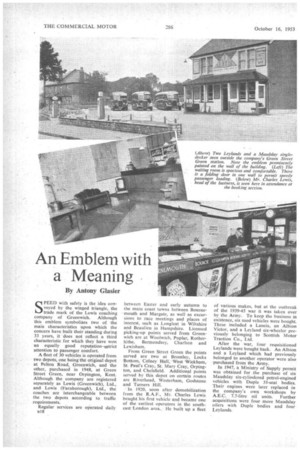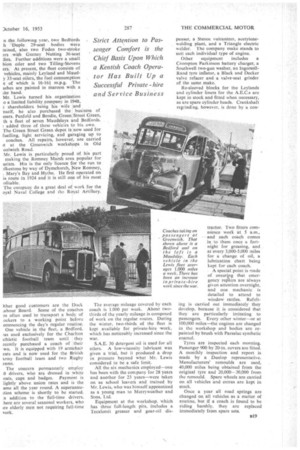An Emblem with a Meaning
Page 52

Page 53

If you've noticed an error in this article please click here to report it so we can fix it.
By Antony Glasier
SPEED with safety is the idea conveyed by the winged triangle, the trade mark of the Lewis coaching company of Greenwich. Although this emblem symbolizes two of the main characteristics upon which the concern have built their standing during 33 years, it 'does not reflect a third characteristic for which they have won an equally good reputation---rstrict attention to passenger comfort.
A fleet of 30 vehicles is operated from two depots, one being the original depot at Felton Road, Greenwich, and the other, purchased in 1948, at Green Street Green, near Orpington, Kent. Although the company are registered separately as Lewis (Greenwich), Ltd., and Lewis (Farnborough), Ltd., the coaches are interchangeable between the two depots according to traffic requirements.
Regular services are operated daily B18 between Easter and early autumn to the main coast towns between Bournemouth and Margate, as well as excursions to race meetings and places of interest, such as Longleat in Wiltshire and Beaulieu in Hampshire. Licensed picking-up points served from Greenwich are at Woolwich, Poplar, Rotherhithe, Bermondsey, Charlton and Lewisham.
From Green Street Green the points served are two at Bromley, Locks Bottom, Colney Ball, West Wickham, St. Paul's Cray, St. Mary Cray, Orpington, and Chelsfield. Additional points served by this depot on certain routes are Riverhead, Westerham, Godstone and Turners Hill.
In 1920, soon after demobilization from the R.A.F., Mr. Charles Lewis bought his first vehicle and became one of the earliest operators in the southeast London area. He built up a fleet of various makes, but at the outbreak of the 1939-45 war it was taken over by the Army. To keep the business in existence, six used vehicles were bought. These included a Lancia, an Albion Victor, and a Leyland six-wheeler previously belonging to Scottish Motor Traction Co., Ltd.
After the war, four requisitions(' Leylands were bought back. An Albion and a Leyland which had previously belonged to another operator were also purchased from the Army.
In 1947, a Ministry of Supply permit was obtained for the purchase of six Maudslay six-cylindered petrol-engined vehicles with Duple 33-seat bodies. Their engines were later replaced in the company's own workshops by A.E.C. 7.7-litre oil units, Further acquisitions were four more Maudslay oilers with Duple bodies and four Leylands. n the following year, two Bedfords h Duple 29-seat bodies were Lained, also two Foden two-stroke ers with Gurney Nutting 36-seat les. Further additions were a small bion oiler and two Tilling-Stevens ers. At present, the fleet consists of vehicles, mainly Leyland and Maudy 33-seat oilers, the fuel consumption e of which is 16-16+ m.p.g. The aches are painted in maroon with a tile band.
Mr. Lewis turned his , organization o a limited liability company in 1948, e shareholders being his wife and nself, he also purchased the business of essrs. Penfold and Brodie, Green Street Green, th a fleet of seven Maudslays and Bedfords. added three of these vehicles to his own. The Green Street Green depot is now used for fuelling, light servicing, and garaging up to coaches. All repairs, however, are carried it at the Greenwich workshops in Old oolwich Road.
Mr. Lewis is particularly proud of his part making the Romney Marsh area popular for urists. His is the only licence for the run to )Ikestone by way of Dymchurch, New Romney, . Mary's Bay and Hythe. He first operated on is route in 1924 and it is still one of his most ofitable.
The company do a great deal of work for the oyal Naval College and the Royal Artillery.
hher good customers are the Dock abour Board. Some of the coaches re often used to transport a body of ockers to a working point before ommencing the day's regular routine. One vehicle in the fleet, a Bedford, ;as used exclusively for the Charlton kthletic football team until they ecently purchased a coach of their wn. It is equipped with 19 armchair eats and is now used for the British .rmy football team and two Rugby earns.
The concern permanently employ 0 drivers, who are dressed in white oats, caps and badges. Payment is lightly above union rates and is the ame all the year round. A superannuition scheme is shortly to be started. 'n addition to the full-time drivers, here are several seasonal workers, who ire elderly men not requiring full-time vork.
The average mileage covered by each coach is 1,000 per week. About twothirds of the yearly mileage is composed of work on the regular routes. During the winter, two-thirds of the fleet is kept available for private-hire •work, which has noticeably increased since the war.
S.A.E. 30 detergent oil is used for all oilers. A low-viscosity lubricant was given a trial, but it produced a drop in pressure beyond what Mr. Lewis considered to be a safe limit.
All the six mechanics employed—one has been with the company for 28 years and another for 23 years—were taken on as school leavers and trained by Mr. Lewis, who was himself apprenticed as a young man to Merryweather and Sons, Ltd.
Equipment at the workshop, which has three full-length pits, includes a Tecalemit greaser and gear-oil dis
penser. a Steno', vulcanizer, acetylenewelding plant, and a Triangle electric welder. The company make stands to suit each individual type of engine.
Other equipment includes a Crompton Parkinson battery charger, a Southwell two-gun washer, an IngersollRand tyre inflator, a Black and Decker valve refacer and a valve-seat grinder of the same make, Re-sleeved blocks for the Lcylands and cylinder liners for the A.E.C.s are kept in stock and fitted when necessary, as are spare cylinder heads. Crankshaft regrinding, however, is done by a con tractor. Two fitters commence work at 5 a.m., end each coach comes in to them once a fortnight for greasing, and at every 3,000-5,000 miles for a change of oil, a lubrication chart being kept for each coach.
A special point is made of ensurieg that emergency repairs are always given attention overnight, and one mechanic is detailed to attend to window rattles. Refelting is carried out immediately they develop, because it is considered that they are particularly irritating to passengers. Every other winter—or at 100,000 miles—the engines are changed in the workshop and bodies arc repainted by brush with Parsalac synthetic enamel.
Tyres are inspected each morning. Passenger-900 by 20-in. covers are fitted. A monthly inspection and report is made by a Dunlop representative. Manufacturers' nemoulds are used, 40,000 miles being obtained from the original tyre and 20,000-30,000 from the remould. Spare wheels are carried on all vehicles and extras are kept in stock.
Once a year all road springs are changed on all vehicles as a matter of routine, but if a coach is found to be riding harshly, they are replaced immediately from spare sets.




























































































